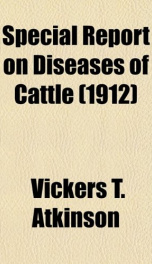Special Report on Diseases of Cattle

Purchase of this book includes free trial access to www.million-books.com where you can read more than a million books for free. This is an OCR edition with typos. Excerpt from book: Plate IIIContinued. or after having had a little oil or lard rubbed upon it to facilitate Its passage. There It Is allowed to remain two or three minutes, then withdrawn, and the temperature read as in any ordinary thermometer. The clinical thermometer is made self-registering; that is, the mercury in the stem remains at the height to which it was forced by the heat of the body until it is shaken back into the bulb by taking hold of the upper portion of the instrument and giving it a short, sharp swing. The normal temperature of cattle varies from 100" to 103 F. In young animals it is somewhat higher than in old. The thermometer is a very useful Instrument and frequently is the means by which disease is detected before the appearance of any external sign. Fig. 2. Simple probang, used to dislodge foreign bodies, like apples, potatoes, eggs, etc., which have become fastened or stuck in the esophagus, or gullet. Fig. 3. Grasping or forceps probang. This instrument, also intended to remove obstructions from the gullet, has a spring forceps at one end In the place of the cup-like arrangement at the end of the simple probang. The forceps are closed while the probang is being Introduced; their blades are regulated by a screw In the handle of the Instrument. This probang is used to grasp and withdraw an article which may have lodged in the gullet and cannot be forced into the stomach by use of the simple probang. Fig. 4. Wooden gag, used when the probang is to be passed. The gag is a piece of wood which fits In the animal's mouth; a cord passes over the head to hold it in place. The central opening in the wood is intended for the passage of the probang. Figs. 5o and 56. Trocar and cannula; 5a shows the trocar covered by the cannula; 56, the cannula from which the trocar ha...
Info about the book
Author:
Series:
Unknown
ASIN:
124891760X
Rating:
3.5/5 (2)Your rating:
0/5
Languge:
English
Users who have this book
Users who want this book
What readers are saying
What do you think? Write your own comment on this book!
write a commentGenre
if you like Special Report on Diseases of Cattle try:
Other books by this author
Do you want to exchange books? It’s EASY!
Get registered and find other users who want to give their favourite books to good hands!

